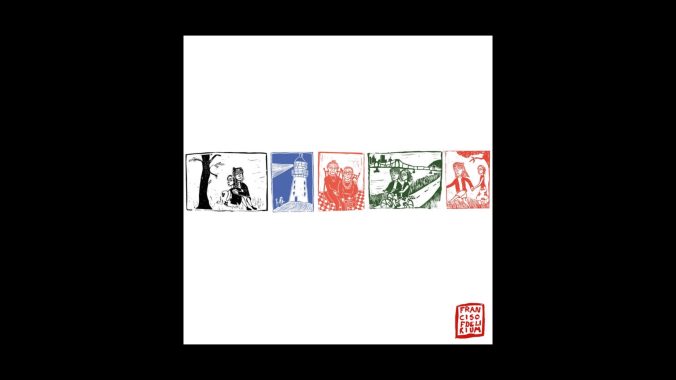Francis of Delirium Shows Out for Luxembourg on Lighthouse
A project as thematically poignant as it is sonically captivating, Jana Bahrich’s debut captures a talented, budding young artist at the crossroads between adolescence and adulthood.
Music Reviews Francis of Delirium
Luxembourg isn’t traditionally known for being a global cultural hub. A small, landlocked country situated in Western Europe with a smaller population than many major United States cities, the nation’s live music scene was practically non-existent just three decades ago. Many bands had to travel across the border to neighboring France and Belgium to play gigs and, even in recent years, venue managers still lament the country’s musical brain drain—as artists are often forced to move away to bigger cities to have a chance at making it in the industry.
That’s what makes Francis of Delirium’s debut album Lighthouse all the more special. The creative brainchild of 22-year old frontwoman Jana Bahrich, who works closely with producer Chris Hewett, Francis is celebrated locally and beyond for her emotionally raw, stream-of-consciousness-suffused alt-rock. Having toured with the likes of The 1975 and Soccer Mommy, she’s a regular on the European live circuit and has earned a reputation as a shining beacon of hope for the country’s music scene. Becoming a symbol of national pride before you’ve even released a debut album is a lot of pressure for anyone, especially a new act. But just as with her acclaimed string of EP releases—Francis doesn’t disappoint on her first proper outing.
Lighthouse is an album that opens with a bang rather than a whisper. An artist often-celebrated for her emotional candor, Bahrich lays all of her cards on the table on “Ballet Dancers (Never Love Again),” a sweeping, rock-infused orchestral ballad. Fusing genres while juxtaposing hyper-specific imagery with heart-wrenching lyricism isn’t easy (“Twirling ballet dancers on the corner of a 7-11 / At the end of our lives we’ll say we loved each other forever”), but Bahrich is that rare artist that makes it look effortless. It’s a song that builds momentum throughout and, by the time she unleashes the impassioned, repeated declaration “I will never love again” at the track’s crux, it’s a clear front-runner for one of the best album intros of 2024 to date.
Nostalgia for the things that aren’t yet bygone is a recurring theme throughout Lighthouse. In the same orbit as late-stage coming-of-age albums like Lorde’s 2017 classic Melodrama, Lighthouse listens like the very last day of adolescence. Bittersweet, carefree and anxious, yes— but, at its core, the record is overwhelmingly hopeful, and it’s this exact quality that takes tracks like “Alone Tonight,” one of the album’s best moments, to the next level. Driven by a twangy Americana riff bursting at the seams with the romance of an open road, Francis of Delirium packs the song to the brim with unabashed fear and love and everything in between. “Been thinking about getting older, what my parents believe in,” she sighs, just lines before conceding that “All the worrying does is clog up all the love” and steadying herself again.
But it’s this exact recognition that endings give way to new beginnings that allows us to fill the ever-larger shoes our own aging demands of us. This clarity shines through on “Who You Are,” a track that listens like the clear-eyed wake-up call from the honeymoon phase, right before the other shoe drops. “So is this who you are? Freak out when it gets too hard?,” she asks pointedly, moments before admitting that her own feelings have faded.
That’s not to say that we shouldn’t mourn our past selves, our past loves, our past friends or our past lives. In fact, you could argue that it’s our willingness to face pain that is necessary in making way for healing. Bahrich taps boygenius producer Catherine Marks for “Real Love,” an achingly wistful track that sounds like it came straight from the first dance scene of a much-loved ‘90s rom-com (“We were just kids when we met / Now we’re half-drunk on a twin-size bed”). She drops listeners right into the throes of emotional confessionals on “Want You,” a steel-fisted gut punch masquerading as a dreamy slow-burn (“‘Cause being back with you/Is being back with me”). And she’s able to find the beauty in love, even if it’s gone-past, on “First Touch” (also produced by Marks), dropping one vulnerable admission after another with steadfast determination (“I remember when we first touched / I remember where we first fell in love”).
At its best, Lighthouse feels like someone reading their personal diary aloud to you, gory details and all. A project as thematically poignant as it is sonically captivating, it’s a rewarding listening experience that captures a talented, budding young artist like Francis of Delirium at the crossroads between adolescence and adulthood. It’s as if Lighthouse is the finished product of Bahrich’s feverish determination to immortalize Kodak moments of her life’s experience, before the freshness of adolescence is lost to the unreliability of memory and the relentless forward march of time. She smiles at the ghosts of her past lives on “Starts to End,” acknowledging the beauty of this moment, this storybook last day of summer, before she must move on and it, too, is swept away in the vast sea of time.
Elizabeth Braaten is a writer from Houston, Texas.